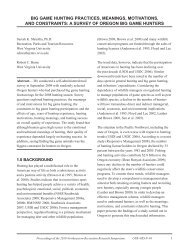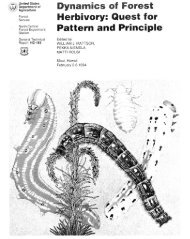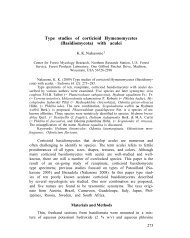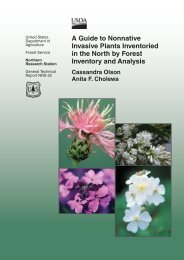Proceedings of the 2009 northeastern recreation research symposium
Proceedings of the 2009 northeastern recreation research symposium
Proceedings of the 2009 northeastern recreation research symposium
You also want an ePaper? Increase the reach of your titles
YUMPU automatically turns print PDFs into web optimized ePapers that Google loves.
Sarah Young<br />
Human Dimensions <strong>of</strong> Marine and Coastal Ecosystems<br />
University <strong>of</strong> Massachusetts, Amherst<br />
syoung@nrc.umass.edu<br />
David Loomis<br />
University <strong>of</strong> Massachusetts, Amherst<br />
DIVER PERCEPTIONS OF FLORIDA KEYS<br />
REEF CONDITIONS BY SPECIALIZATION LEVEL<br />
Abstract.—Understanding diff erent user-group<br />
values, preferences, and perceptions can lead to more<br />
effi cient and eff ective management decisions, reducing<br />
confl ict and helping to balance eco-societal goals. User<br />
perceptions <strong>of</strong> reef condition, ecological health, and<br />
impacts to reefs can provide valuable information to<br />
managers on motivations, values, willingness to comply<br />
with regulations, satisfaction <strong>of</strong> experience, and potential<br />
sources <strong>of</strong> confl ict. Perceptions and values within user<br />
groups are heterogeneous in terms <strong>of</strong> motivations,<br />
satisfactions, and characteristics. Specialized divers tend<br />
to have more specifi c resource requirements. Th is study<br />
uses specialization <strong>the</strong>ory to subdivide divers in <strong>the</strong><br />
Florida Keys into meaningful specialization categories<br />
to achieve a more sophisticated understanding <strong>of</strong> diver<br />
perceptions <strong>of</strong> reef condition. Th e responses to six<br />
structured questions were analyzed to assess perceptions<br />
<strong>of</strong> ecological health and impacts to reefs. Overall, <strong>the</strong><br />
survey results were varied, with only highly specialized<br />
divers showing signifi cantly diff erent responses to<br />
hypo<strong>the</strong>tical variations in reef condition.<br />
1.0 INTRODUCTION<br />
Coral reefs are recognized as having signifi cant biological,<br />
social, and economic value to both <strong>the</strong> communities<br />
<strong>the</strong>y support and wider society (Cesar 2000). Managing<br />
areas <strong>of</strong> reef to meet both ecological and user demands<br />
presents a complex challenge. When environmental and<br />
<strong>recreation</strong> managers understand diff erent user-group<br />
values, preferences, and perceptions, <strong>the</strong>y can make<br />
decisions that promote more effi cient and eff ective<br />
resource management, reduce confl ict, and help to<br />
balance ecological and societal goals. User perceptions<br />
<strong>of</strong> reef condition, ecological health and impacts to<br />
reefs can provide valuable information to managers<br />
on motivations, values, willingness to comply with<br />
restrictions, satisfaction <strong>of</strong> experience, and potential<br />
sources <strong>of</strong> confl ict. For example, it would be very<br />
diffi cult to enforce a no-access regulation based on<br />
ecological criteria to an area that users perceive to be in<br />
good condition. Perception <strong>of</strong> resource condition and<br />
acceptability <strong>of</strong> diff erent reef conditions can also be used<br />
for monitoring social carrying capacity and <strong>the</strong> shifting<br />
baseline <strong>of</strong> resource acceptability. However, information<br />
relating to individual user groups may be insuffi cient.<br />
Even within a user category, such as divers, values diff er<br />
signifi cantly. Th is study uses <strong>recreation</strong>al specialization<br />
<strong>the</strong>ory to group divers into diff erent specialization levels<br />
and investigates whe<strong>the</strong>r <strong>the</strong>se groups have diff erent<br />
perceptions <strong>of</strong> reef condition, ecological health, and<br />
impacts on reefs.<br />
Recreation specialization <strong>the</strong>ory (henceforth referred<br />
to as “specialization <strong>the</strong>ory”) was fi rst proposed by<br />
Bryan (1977), later refi ned by Ditton et al. (1992), and<br />
subsequently used as a framework to investigate a variety<br />
<strong>of</strong> natural resource conservation issues. (For a selection<br />
<strong>of</strong> applications, see Dearden et al. [2006], Mangun et<br />
al. [2007], and Oh and Ditton [2008]). Specialization<br />
<strong>the</strong>ory postulates that outdoor <strong>recreation</strong> participants<br />
(e.g., anglers, SCUBA divers, boaters) can be placed on<br />
a continuum from general interest and low involvement<br />
to expert interest and high involvement in a leisure social<br />
world. Each level <strong>of</strong> specialization involves a change in<br />
distinctive behaviors, skills, and directions. Th ese include<br />
equipment preference, type <strong>of</strong> experiences sought (goals),<br />
desired setting for <strong>the</strong> activity, attitudes toward resource<br />
management, preferred social context, and vacation<br />
patterns. Th e concept <strong>of</strong> <strong>recreation</strong> specialization allows<br />
<strong>research</strong>ers to analyze subgroups <strong>of</strong> populations, ra<strong>the</strong>r<br />
than aggregate <strong>the</strong> attitudes and preferences <strong>of</strong> novice,<br />
medium, and advanced participants.<br />
Th is study used data from divers in <strong>the</strong> Florida<br />
Keys to describe diff erences in <strong>the</strong> perception <strong>of</strong><br />
<strong>Proceedings</strong> <strong>of</strong> <strong>the</strong> <strong>2009</strong> Nor<strong>the</strong>astern Recreation Research Symposium GTR-NRS-P-66<br />
24
















